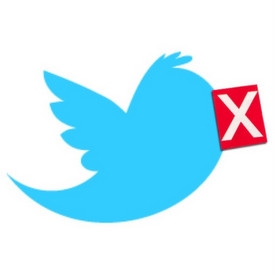AT&T Complains It Was ‘Blocked’ By Twitter
AT&T Complains It Was ‘Blocked’ By Twitter
by Wendy Davis , Staff Writer @wendyndavis, July 27, 2017
In a demonstration of its questionable views on net neutrality, AT&T this week suggested that Twitter violated open Internet principles by flagging an AT&T blog post as potential spam.

“The ‘no blocking’ prohibition … apparently doesn’t apply to all internet companies, only those that are scripted as the black hat villains,” AT&T Senior Vice President Joan Marsh opined in a blog post.
Marsh was referring to the events of July 11, one day before the so-called “Day of Action,” which involved tech companies trying to publicly rally support for the net neutrality rules. On July 11, AT&T’s Bob Quinn wrote that the company — which is currently trying to overturn the net neutrality rules in court — planned to join the Day of Action.
That claim was rightly mocked by many observers, especially because Quinn’s post made clear that the company still wants to gut the 2015 net neutrality rules. In the post, Quinn lamented that the 2015 net neutrality rules subject broadband providers to “heavy-handed, outdated telephone regulations,” adding that the net neutrality order “jeopardizes the prospects for continued innovation and robust growth we have witnessed since the internet’s creation.”
The 2015 rules classified broadband access as a utility service and imposed some common carrier rules on internet service providers, including bans on blocking and throttling service, and on charging higher fees for prioritized delivery. If broadband is reclassified an “information” service, as AT&T argues it should be, the FCC will no longer have the authority to ban blocking, throttling or paid prioritization.
The day Quinn’s post went live, Twitter mistakenly classified AT&T’s site as potentially harmful. Twitter said the move was a glitch, and that the site was incorrectly flagged by the company’s spam filters.
But for the four hours or so that the site was caught in the spam filter, Twitter users weren’t able to automatically tweet AT&T’s post by clicking on the site’s Twitter button.
AT&T apparently is still aggrieved over the incident. “In the seven and a half years we’ve had our public policy site, we’ve never been caught up in the Twitter spam filter — only on the Day of Action,” Marsh writes.
She goes on to write that “maybe Congress will have some luck” in obtaining more information from Twitter — referring to a recent letter to the company by two House Republicans. In that missive, they said they were “deeply troubled” by allegations that Twitter “blocked AT&T.”
Twitter has said the block on AT&T was a glitch, and there’s every reason to think that’s true — especially considering Twitter’s history of allowing all sorts of political viewpoints on the service.
Regardless, Twitter can’t violate net neutrality principles for the simple reason that Twitter isn’t a broadband provider. In fact, even if Twitter — or any other web publisher, search engine or social network — blocks a site, interested users have other ways of reading the material, including by directly navigating to it.
On the other hand, if AT&T were to block Twitter that would violate net neutrality principles, and for good reason. After all, that kind of move by an ISP could require customers to change providers in order to access the content they want — a process that takes significantly more time and effort than simply navigating to another website.
MediaPost.com: Search Marketing Daily
(21)












